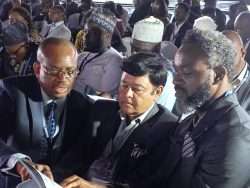
Stakeholders in the international health sector have applauded the pace of growth and innovation that has characterised the Nigerian pharma manufacturing sector. They gave their commendations at the ongoing 7th Nigerian Pharma Manufacturers’ Expo.
The event which kicked off on Wednesday at the Sheraton Hotel Lagos, with the theme: “40 Years of Advocacy: Fostering Partnership & Innovation to Unlock the Pharma Manufacturing Value Chain in Nigeria, Central & West Africa”, witnessed presentations from key players, regulators, policy makers and government agencies as well as international organisations.
The speakers lauded the quality of interventions in the Nigerian local manufacturing space while calling for more innovative collaborations aimed at sustaining a steady improvement in terms of manufacturing and regulatory standards.

In his goodwill message, Dr Walter Mulombo, WHO Representative in Nigeria, ably represented by Coordinator of the Lagos Office, Dr Ifeoma Okafor, commended the organisers of the event for providing a platform for the cross-fertilisation of ideas required for the transformation of the local pharmaceutical sector in Nigeria. He reiterated WHO’s commitment to offering the needed support to member states in order to raise the standard of local medicine manufacturing.
“This event is in alignment to the government of Nigeria’s agenda on local manufacturing which is a major pillar in the Health Sector Strategic Blueprint and being implemented under the Pillar 3 of the Sector-Wide Approach (SWAp).
“World Health Assembly resolutions WHA74.6 and WHA67.2O mandated the WHO Secretariat to continue supporting member states, at their request, in promoting quality and sustainable production of medicines and other health technologies and to strengthen regulatory systems.
“Member states at the just concluded 74th session of the WHO Africa Regional Committee meeting in Brazzaville, Republic of Congo, approved the framework for strengthening local production of medicines, vaccines and other health technologies in the WHO Africa Region”, he said.
Assuring stakeholders of WHO’s ongoing efforts towards supporting the Nigerian pharma manufacturing sector, Dr Mulombo, added that a lot has been put in place by the apex health body to ensure that Nigerian manufacturers continue to excel at the global stage.
“As part of efforts to support Nigeria to improve on local production of medicines, vaccines, diagnostics and other health technologies, WHO is conducting a support mission to the country on mRNA and diagnostics technology transfer and will be engaging with government agencies on regulatory approvals.
“The WHO prequalification services are also ongoing with more companies showing interest in areas of medicines, syringes, needles and diagnostics. We congratulate Swiss Pharma Nigeria for the record-breaking achievement of the second prequalified medicine in the West Africa region. WHO will continue to work with other UN agencies and development partners to ensure uptake of such quality products”, he added.

Director-General of NAFDAC, Professor Mojisola Adeyeye, while expressing her confidence in the ability of local manufacturers to blaze the trail of unprecedented outcomes in terms of the delivery of cutting-edge medicines, she described them as patriots who deserved to be celebrated for steadily keying into the policy direction and regulatory framework of the renowned food and drug agency.
She added that NAFDAC has been passionately involved in every effort to improve the standard, output and reputation of local manufacturers to enable them compete globally. She also eulogized Swiss Pharma for their recent second WHO prequalification, stressing that it is a result of the quality of strategic partnership between the regulator and manufacturers in the country.
“Most importantly is the celebration of our patriots. Our patriots are the local manufacturers. It is almost about seven years ago that I took over the DG position at NAFDAC and since that time, we have been doing implementation, not just talking.
“It has been forty years of advocacy and even years of implementation. Right from the word GO, we have been doing focused regulation just as the PMG-MAN Chairman has confirmed. Whatever you are seeing in the Nigerian pharmaceutical industry today is due to the fact that we are still under construction.
“Today, NAFDAC doesn’t sleep because we are working hard to make sure that local manufacturing becomes 70 per cent and importation 30 per cent. Seven years ago at the NAIP conference in Ilorin, I did mention that we were going to reverse the state of our local manufacturing/importation ratio. Local manufacturing is important because we get more quality medicines from there.
“We have given manufacturers a six-month roadmap for Good Manufacturing Practice. Therefore, once a manufacturer falls out of track, we are usually there within two hours to enforce our rules. This is why local manufacturing is not just access but access to quality medicines.
“I want to recognise our Indian partners, because when we started 5+5 four years ago, they stepped up. We have to recognize that fact. Today, we are no longer producing 30 per cent locally. It is almost 40 per cent. We shall soon make this official pronouncement.
“We started the journey at NAFDAC by thinking quality. We had to change our mindset by going through training for one year and six months and by 2019, we got our ISO 90001. Since then, we have been recertified every year. It is a continuous quality improvement”, she said.
On his part, Registrar of the Pharmacy Council of Nigeria (PCN), Pharm. Ibrahim Babashehu Ahmed, represented by the Director of Inspection, Monitoring and Quality Assurance, Dr Amina Shekarau Omar, called on stakeholders in the local pharma manufacturing sector to collaborate in order to improve the overall performance of the sector. He also reiterated PCN’s commitment towards enhancing the growth and quality of the local manufacturing sector.
“Players in the pharma sector need to collaborate to co-create value. We expect that this expo will highlight areas of collaboration and innovation. PCN is committed to the growth of the pharma sector in Nigeria”, he said.
Keynote Speaker, Professor Padmashree Geh Sampath, CEO, African Pharmaceutical Technology Foundation, Kigali, Rwanda and Senior Advisor to the President of the African Development Bank (AfDB), Abidjan, Cote d’Ivoire, who was represented by Dr Olajide Adebola, chair, National Technical/Mirror Committee on ISOTC 215 – Health Informatics, harped on the need to strengthen the local manufacturing sector in Nigeria, adding that as a result of the many challenges it had faced, it has been unable to live to its full potentials of offering the expected level of medicine security to its teeming population. In spite of those challenges however, he highlighted the positives coming out of the local pharma manufacturing space in Nigeria.
“In the last five years, the Nigerian pharmaceutical and vaccines segments have undergone noticeable development. This has been aided by various factors such as population growth, disease burden, healthcare infrastructure, government policy and global health initiatives.
“The country’s efforts in pharmaceutical production has been steadily expanding. Such efforts have been responsible for the steady decline of drug importation into the country.
“As we gather here for the 7th Nigeria Pharma Manufacturers’ Expo, I want us to give a large applause to the men and women who have made this event possible. We have increased domestic manufacturing from 20 per cent a decade ago to over 30 per cent today. We must ensure we move forward. We must work towards attaining 50 per cent local manufacturing.
“We cannot move forward without learning from history. We have seen the effects of lack of domestic manufacturing during the COVID era. There is so much more to be done. We cannot allow history to repeat itself.
“Africa cannot rely on international advisers to assure the access of its population to end products, vaccines or other medical products for that matter. That is why the Africa Development Bank launched a three billion dollar pharmaceutical action plan to revamp and support Africa’s pharmaceutical industry to manufacture essential medicines and vaccines”, she said.
In his remarks, Comptroller Babatunde Olomu, who represented the Comptroller-General of the Nigeria Customs Service, Alhaji Bashir Adewale Adeniyi, said the gathering was an opportunity to chart an illustrious path for the Nigerian pharmaceutical manufacturing landscape. He added that the Nigeria Customs Service will continue to collaborate with the Nigerian Pharmaceutical industry by ensuring best practices in terms of reducing drug importation into the country.
“The mandate of the Nigeria Customs Service is not only to facilitate trade but also to ensure that the goods entering our borders meet the highest standards of quality and safety. We are actively engaged in preventing the entry of substandard and counterfeit medicines which pose significant risks to the health of every Nigerian.
“The service understands that the challenges facing the pharmaceutical sector are complex. For this, we are committed to fostering partnerships with key stakeholders, government agencies, industry players and international partners to build a regulatory environment that supports innovation and growth”, he said.
Speaking also, Lagos State Commander, CN AM Wali, who represented the Chairman and Chief Executive Officer of the National Drug Law Enforcement agency (NDLEA), pledged his agency’s commitment to sustaining Nigeria’s fight against the distribution of illicit medicines while also confronting the menace of drug abuse.
“We pledge our commitment towards ensuring that our drugs in Nigeria are legally produced, distributed and consumed. We are working to ensure that the circulation of illicit drugs is thoroughly halted. We are also committed to ensuring that the Nigerian pharmaceutical industry receives the right support in sustaining the fight against drug abuse and illicit trafficking”, he said.
Describing the relationship between India and Nigeria as very fruitful and mutually beneficial, the Indian Deputy High Commissioner to Nigeria, Ms Vartika Rawat, said the Pharma Expo underlines the significance of such a relationship, adding that Indian pharma companies have continued to make immense contributions to the Nigeria pharma industry.
“Nigeria and India are collaborating for enhanced pharmaceutical production and development. India has invested over 40 billion dollars in the Nigerian pharmaceutical industry”, she said.
Earlier, in his welcome address, Chairman of PMG-MAN and Managing Director of Daily Need Industries Limited, Mr Oluwatosin Jolayemi, ESQ, said: “Lessons learnt from COVID-19 have necessitated the need to boost local production. Today, some of our members have secured WHO prequalification.
“We also have to celebrate the achievements of NAFDAC in ensuring the high standard of our laboratories. NAFDAC must further be strengthened to enable it perform its regulatory activities better. We hope our guests/exhibitors discover new business opportunities in Nigeria.
Also in his opening remarks, Chairman of the 7th Nigeria Pharma Manufacturers’ Expo and Managing Director of May & Baker PLC, Pharm. Patrick Ajah, thanked all stakeholders who made the event possible. He said: “Over 55 companies from China and India are represented here today. Over 110 companies from PMG-MAN are also here. It is time our local manufacturers begin to export their products to other countries of the world. We hereby call on government to support with more resources to help the local pharmaceutical industry work better.”










